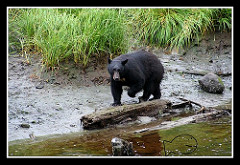
Bear by Kylie Kae on Flickr
A warning from Parks Canada reminds outdoor workers to be prepared for bears by travelling in groups, carrying bear spray, and driving with care.
“Over the winter bears lose 15-30% of their body weight, so they’re hungry!” reads this update from Parks Canada, which I found via Twitter recently.
“There’s not much for them to eat at this time of year, so they’ll be moving around a lot trying to find carcasses of animals killed over the winter and the roots and shoots of plants just emerging from the snow,” reads the bulletin.
“Remember that it is possible to surprise a bear anywhere here, be it on a busy trail close to town or in the remote backcountry.”
I wrote about an archaeologist in my post Working in bear country and more recently I talked with someone who had to prepare for wildlife encounters near a busy trail close to town.
“I worked in an area with bears in a wooded area in the film industry,” he said, describing what he and fellow crew members were told.
“Do not approach them, have an airhorn, do not roll into a ball if they approach you. Lay flat on the floor dead with your hands on the back of your neck. At least that’s what they told us at the time. I don’t know if it’s changed now.”
He never did see a bear at work, which is good because his tactic isn’t recommended for all bears. “Playing dead” is only recommended for encounters with grizzly bears, but not black bears, according to Actsafe Safety Bulletin #31a: British Columbia Wildlife, which describes how to minimize the risk when working in the vicinity of bears, cougars, and wolves.
The bulletin covers how to avoid bears, means to control them, and how to survive attacks – with different instructions for black bears vs. grizzlies – as well as cougars and wolves. If you go into the woods, please take all precautions – and let me know, in the comments below, if you have any close encounters to share.


